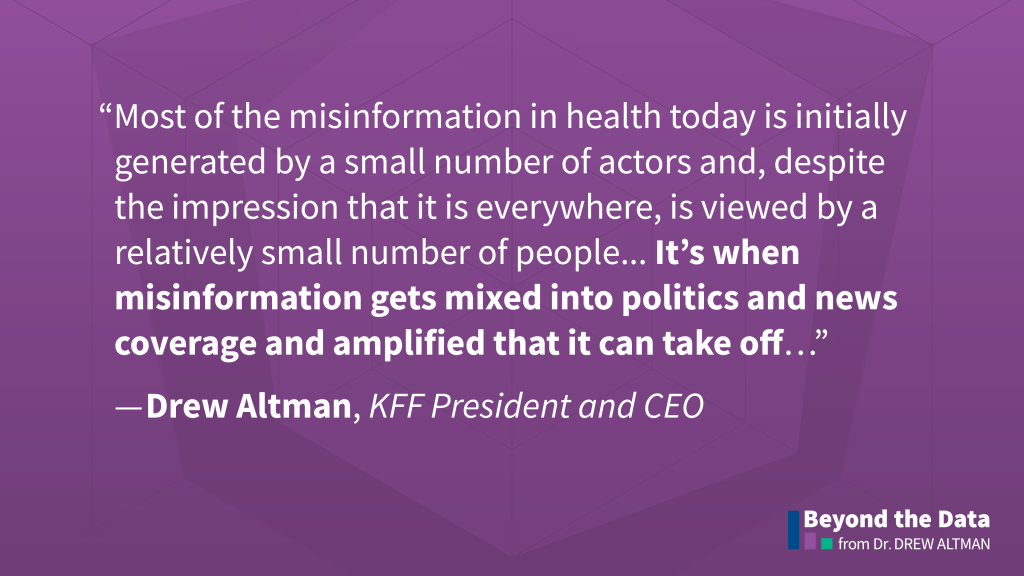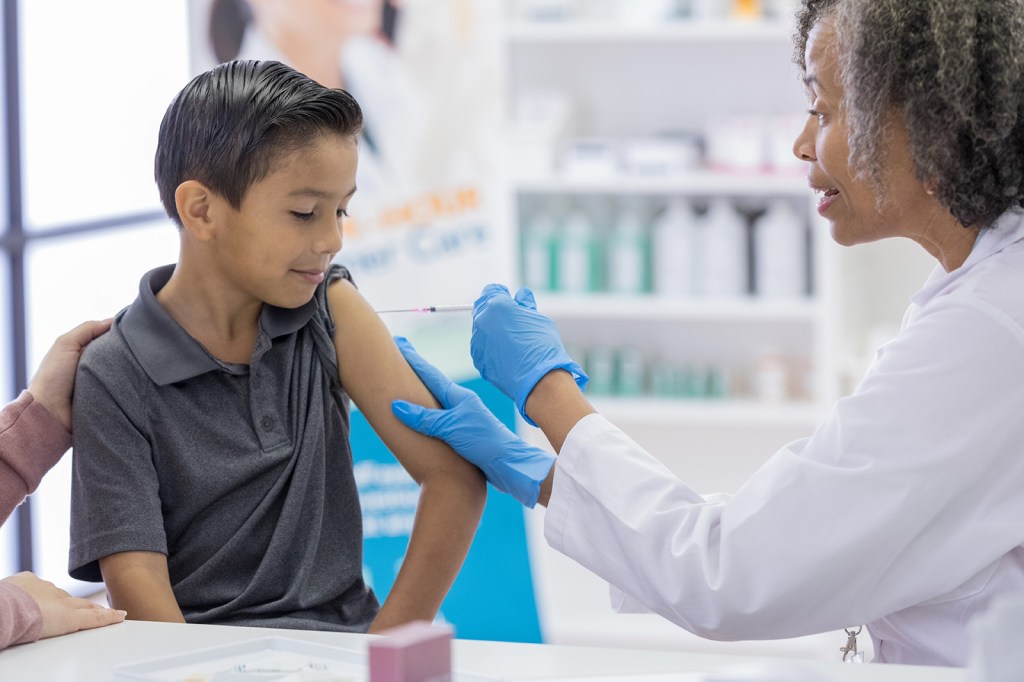
The independent source for health policy research, polling, and news.
VOLUME 4
Pfizer Lawsuit and Debunked Study Undermine COVID-19 Vaccine Recommendations
This is Irving Washington and Hagere Yilma. We direct KFF’s Health Misinformation and Trust Initiative and on behalf of all of our colleagues across KFF who work on misinformation and trust we are pleased to bring you this edition of our bi-weekly Monitor.
Note: Our next issue of the Monitor, which will be a special edition focused on the intersection of health misinformation and artificial intelligence, will be published on August 22.
Summary
In this Monitor, we explore how ongoing misinformation about the safety and efficacy of COVID-19 vaccines may affect the acceptance of new vaccine recommendations. First, we examine the false and misleading claims underlying the Kansas Attorney General’s lawsuit against Pfizer. We also discuss the CDC’s most recent vaccine recommendations and the resurfacing of a debunked study that has revived vaccine safety claims.
Featured
What “Death Panels” Can Teach Us About Health Misinformation

In last week’s “Beyond the Data” column, KFF’s CEO, Dr. Drew Altman, emphasizes how a lot of health misinformation often isn’t seen by many people on social media, but it can significantly impact the public when amplified by political figures and the news media, creating a cycle of misinformation that is difficult to break.
Emerging Misinformation Narratives
Kansas Cites Misleading Claims About Vaccine Safety in Lawsuit Against Pfizer

Kansas Attorney General Kris Kobach filed a lawsuit against Pfizer last month, resurfacing false claims about vaccine safety. Kobach accuses Pfizer of downplaying potential risks such as myocarditis and pregnancy complications, citing misinformation to support the lawsuit. However, the chance of developing myocarditis after vaccination is rare and the FDA already issued a myocarditis warning last year. Studies also show that the COVID-19 vaccine does not increase the risk of miscarriage.
Following the announcement of the lawsuit, there was a spike in social media posts about Pfizer. The top five posts came from accounts known for opposing vaccines, and they all expressed distrust of Pfizer. Some of these posts and comments echoed the lawsuit’s false claim that COVID-19 vaccines carry a high risk of heart inflammation. For example, one post said “…it’s definitely not normal for children to have heart attacks. I’m so happy I stayed strong and refused to put this in my family.” Many posts also suggested that pharmaceutical companies should be held accountable for alleged wrongdoing. Another post said, “Every state has to hold these companies accountable for injecting poison into people’s bodies.”
The false narratives suggest that vaccine opponents are leaning on years-old talking points to discourage COVID-19 vaccination, despite extensive research showing that COVID-19 vaccines have not caused mass death and that heart inflammation is much more common and more severe after a COVID-19 infection, not vaccination. We expect vaccine opponents to continue recycling false claims when major COVID-19 related news occurs.
More Misinformation Narratives to Watch
- Bird Flu: H5N1 bird flu has continued infecting animals throughout the U.S., and, as of July 21 10 human cases have been reported in the U.S.. In July, news outlets reported that Moderna is developing an mRNA bird flu vaccine that can be distributed if further human outbreaks occur. Most of the 42,000 posts, articles, comments and videos mentioning bird flu and Moderna in the past 30 days were published immediately following the announcement. Some of the most popular social media posts falsely claim that bird flu is a “hoax” designed to make money for pharmaceutical companies or that bird flu vaccines are part of a “depopulation plan.”
- Hepatitis B: Several social media accounts with large followings are circulating false claims that the hepatitis B vaccine is unsafe for infants. An X post shared on June 20 falsely claimed that Hepatitis B disease poses no risk to infants and that the vaccine contains a toxic amount of aluminum. As of July 8, that post received 1.7 million views, 21,000 likes, 11,000 shares, and 477 comments. Most comments on the post agreed with its false claims, and many also expressed distrust in COVID-19 vaccines. But some comments debunked the author’s false claims about Hepatitis B while still expressing distrust in mRNA vaccines. For example, one post said, “Bad take bro. You can talk about mRNA vaccines all day but just about every other conventional vaccine is worth it.”
- Whooping Cough: A surge in whooping cough cases across the country has led to online conversations about the disease and vaccines that protect against it. In the past 30 days, there have been 12,000 posts, articles, comments on articles, and videos making false claims about whooping cough garnering 42,100 engagements. The top posts falsely claimed that whooping cough vaccines are ineffective, that they contain toxic heavy metals, and that they cause autism and death in children.
Other Developments
The CDC Recommends Updated COVID-19 Vaccines, But Misinformation Could Undermine Acceptance

Last month, the Centers for Disease Control and Prevention (CDC) updated its vaccine recommendations for COVID-19, along with other infectious diseases such as RSV and influenza. These recommendations come amid a slight increase in COVID-19 cases in the U.S. due to new variants and summer travel. To protect against these new variants before winter, the CDC recommends that everyone six months and older get an updated COVID-19 vaccine this fall. But as manufacturers roll out these new vaccines, misinformation about the safety and effectiveness of mRNA vaccines could sway people’s decisions to get them.
Polling Insights:
With the CDC recommending that everyone ages six month and older receive an updated 2024-2025 COVID-19 vaccine this fall, past data suggests that uptake of a new vaccine iteration may be slow. Last fall, a KFF COVID-19 Vaccine Monitor poll conducted two months after the latest update of the COVID-19 vaccines had been released found that just one in five adults had gotten the updated vaccine and about half said they probably or definitely would not get it.
Even among adults 65 and older – a group that is more likely to get seriously sick and experience complications from the virus – only a third (34%) said they had gotten the updated vaccine last fall, and many said they would not get it (Figure 1).
Debunked Study Resurfaces, Re-Sparking Old Claims About Vaccine Safety

A rejected flawed study linking COVID-19 vaccines to widespread death has resurfaced online. The authors of the study reviewed published research on autopsies related to COVID-19 vaccination and determined for themselves whether the deaths were caused by COVID-19 vaccines. The authors concluded that 74% of the autopsies they reviewed were caused by the vaccine, negating many of the original findings of the studies they reviewed. Fact-checking efforts clarify that the study misinterprets autopsy data and is written by individuals known for spreading COVID-19 misinformation. The study was first submitted to The Lancet and shared online as a pre-print in 2023 but was rejected and removed during peer review for poor methodology. Forensic Science International has now published it, reigniting social media claims about vaccine dangers and censorship of anti-vaccine sentiments. As health professionals prepare for new COVID-19 vaccine rollouts, they will need to address and debunk myths about vaccine safety.
Polling Insights:
Previous KFF polling indicates that misinformation about the COVID-19 virus and vaccines could further contribute to slow or limited uptake of an updated vaccine this fall. The KFF Health Misinformation Pilot Poll conducted last summer found that many adults reported hearing false or misleading statements about COVID-19 and vaccines and substantial shares believed they were probably or definitely true. For example, many said it was probably or definitely true that “the COVID-19 vaccines have caused thousands of deaths in otherwise healthy people” (34%), that “Ivermectin is an effective treatment for COVID-19” (31%), that “the COVID-19 vaccines have been proven to cause infertility” (27%), that “more people have died from the COVID-19 vaccines than have died from the COVID-19 virus” (20%), and that “the measles, mumps, rubella vaccines, also known as MMR, have been proven to cause autism in children” (24%).
The poll further found a strong correlation between views of these claims and COVID-19 vaccination status. Among those who said four or more of those claims were probably or definitely true, just one in five (19%) had received a COVID-19 booster and 60% had not received any COVID-19 vaccines (Figure 2). By contrast, among those who thought none of these claims were true, 79% were boosted and just 7% were unvaccinated for COVID-19.
New FDA Guidance on Dispelling Misinformation May Help Combat Vaccine Myths

The U.S. Food and Drug Administration (FDA) recently released new guidance that could serve as a tool for vaccine manufacturers to combat myths and inaccuracies about their vaccines. The draft guidance suggests how and when companies should develop and publish tailored messages to counter online misinformation about their FDA-approved products. By promptly addressing online misinformation on the platforms where it appears, manufacturers can provide factual, accurate, and scientifically sound information to the public.
Research Updates
COVID-19 Pandemic Impacted Public Trust in Routine Immunization and Health Information
A study in Nature Medicine explored the impact of COVID-19 on public confidence in routine immunization, health information sources, and pandemic preparedness in 23 countries. The study found that the disrupted global routine immunization services and misinformation on social media fueled vaccine hesitancy and affected overall trust in science and pharmaceutical companies. The study also found that the public’s confidence in society’s ability to manage future health crises remained high, but there was less trust in international organizations such as the WHO for pandemic guidance, particularly in countries such as Russia and the U.S.
Source: Lazarus, J. V., White, T. M., Wyka, K., Ratzan, S. C., Rabin, K., Larson, H. J., … & El-Mohandes, A. (2024). Influence of COVID-19 on trust in routine immunization, health information sources and pandemic preparedness in 23 countries in 2023. Nature Medicine, 1-5.
Strategies for Physicians to Address Vaccine Hesitancy
A study published in Vaccines highlights how physicians can reduce vaccine hesitancy by combating misinformation. Researchers interviewed physicians to understand how healthcare providers perceive and respond to patient vaccine hesitancy. Physicians reported addressing concerns about vaccine safety, side effects, misinformation, and distrust of government. The findings suggest that physicians can reduce vaccine hesitancy by engaging patients in open discussions, addressing concerns with empathy, and providing clear, evidence-based information that draws from trusted sources.
Source: Melnikow, J., Padovani, A., Zhang, J., Miller, M., Gosdin, M., Loureiro, S., & Daniels, B. (2024). Patient concerns and physician strategies for addressing COVID-19 vaccine hesitancy. Vaccine, 42(14), 3300-3306.
AI and Emerging Technologies
Ethical Implications of Large Language Models in Healthcare: Balancing Benefits and Risks

Large Language Models (LLMs) are used in healthcare for clinical decision making, diagnosis, and patient communication, but they pose some risks, such as privacy concerns and the potential to spread false information and share biases. A systematic review recently published in Nature Digital Medicine mapped out the ethical landscape of LLMs in healthcare, focusing on their uses, risks, and benefits. The researchers found that LLMs can help medical providers with a number of tasks, including accessing health information, but they can also generate persuasive, inaccurate information that could lead to patient harm. The authors suggest that the use of LLMs in health care could benefit from robust ethical guidelines and careful management to prevent the spread of misinformation.
Support for the Health Information and Trust initiative is provided by the Robert Wood Johnson Foundation (RWJF). The views expressed do not necessarily reflect the views of RWJF and KFF maintains full editorial control over all of its policy analysis, polling, and journalism activities. The Public Good Projects (PGP) provides media monitoring data KFF uses in producing the Monitor.


